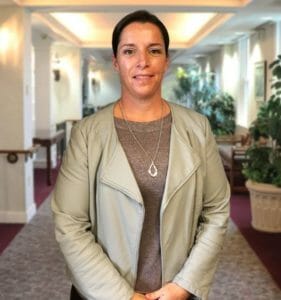Eight months and thousands of vaccinations made an “amazing” difference in two COVID-19 outbreaks at Masonicare’s Wallingford, CT, campus.
Since mid-July, 21 residents at the community’s 333-bed skilled nursing building have tested positive for COVID. All of them, along with 10 infected staff members, had been vaccinated.

Masonicare serves about 4,600 residents and patients across the state’s largest not-for-profit care continuum. It mandated staff vaccinations effective in June and held more than 90 clinics since its first in December. And that, Masonicare Health Center Administrator Courtney Wood said Wednesday, limited symptoms of the most recent outbreak to a large extent.
“The story back last year, we had people that were immediately put on oxygen… some that had to be sent out to the hospital, some that got very sick, very quickly. This go around, it’s quite amazing to watch. I don’t have anyone on oxygen. I don’t have anyone that is desperate in need of medical attention constantly like we did last year,” Wood said. “They’re tired (but) they’re bouncing back. For a day or two, they felt a little under the weather. Then you walk in their room on day three and they’re back up talking to you and wanting to know where their tray is.”
After a single staff member reported an off-site positive COVID test within 24 hours of working, Masonicare leaders responded quickly to stem transmission.
Wood said efforts included immediately stopping visits, outbreak testing the unit where the staffer worked, then expanding that testing to the entire building. Antigen swabbing quickly revealed another worker on the same floor — one without signs or symptoms — was also positive.
Once Masonicare identified the outbreak was limited to its 3 Ramage unit, the team cohorted residents into negative and exposed or positive sections. Staff were also told to return to using N95 respirators and began donning and doffing protective gowns in patient rooms.
While the virus had spread among ambulatory residents of the dementia unit, Wood told listeners on a LeadingAge COVID-19 webinar that the protection of previous vaccinations and supportive measures like IV hydration and nutrition kept symptoms relatively mild. One COVID-positive patient, already on hospice care, died.
“We learned so much from last year and definitely had a plan in place,” Wood said. “Our infection control team just went to work and our nurse managers just knew exactly what we needed to do. Within that (first) 24-hour period, everything was set to go.”
The community also sought help from state epidemiologists to ensure they were following the latest infection control practices. They increased antigen swab testing frequency from weekly to every other day, and then to daily.
Delta’s role in breakthroughs
Wood said she is now working with Centers for Disease Control and Prevention officials to sequence the virus and measure virus shed, a process that should reveal whether the delta variant was at play.
That variant has already been associated with nursing home outbreaks among the vaccinated in Massachusetts and Colorado. Critics have questioned the effectiveness of COVID shots during the nation’s latest surge.
Masonicare has stood by its mandate, which it initially issued in December with the June deadline. In all, the community has a 96% vaccination rate among residents. It granted religious and medical exemptions to 60 employees and “let go” another 22, represeting less than 1% of its workforce, according to Wood.
“Even though vaccinated individuals can still contract COVID-19 – especially the more contagious Delta variant – they are far less likely to require hospitalization. Breakthrough cases will happen, but the outcomes have generally been more manageable,” Masonicare President and CEO JP Venoit wrote on the community’s website last week. “We were among the first in our industry to mandate vaccinations, and I am convinced that decision saved lives.”
Earlier in the week, David Dowdy, associate professor of epidemiology at Johns Hopkins Bloomberg School of Public Health, tried to dispel the idea that vaccines won’t prevent deadly breakthrough cases.
“Even with the delta variant, vaccines seem to be doing their job,” he said on a separate call with LeadingAge members. “The percentage of cases happening in people fully vaccinated is fairly small.”
He put that rate at 2% to 3% “in most states.” But he acknowledged that it’s hard to know how many seniors are being affected by breakthroughs because few states publish side-by-side data listing cases in the fully vaccinated by age range.
His advice is to ramp up masking requirements and “at least” test any workers who know they have been exposed, even if they are fully vaccinated and have no symptoms.
“Cases of COVID right now in the U.S. are about 10 times higher than they were just a few months ago,” he said. “We all need to think of ourselves as at increased risk.”



